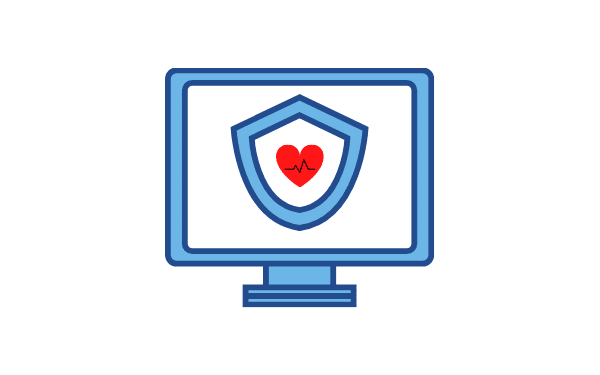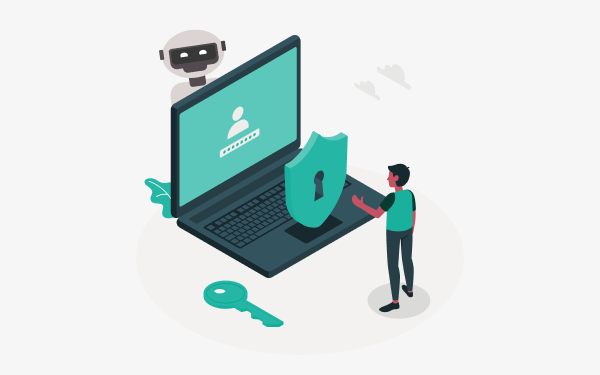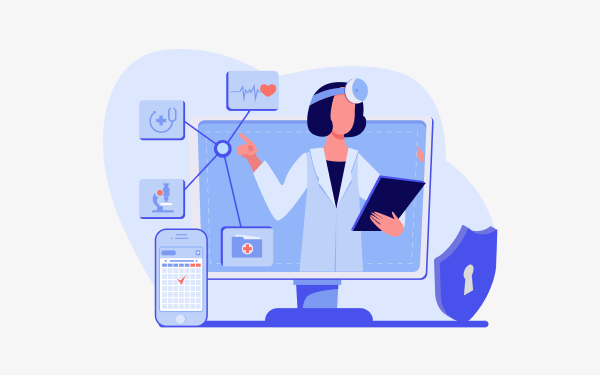
26 Apr Cyber Security in Healthcare: How Can it be Improved?
Cyber Security issues have become a constant struggle for all industries today, and the healthcare industry is no exception. Hacking into and breaching of data from common devices like smartphones, and sophisticated hardware like IoT devices, are frequent and ever-increasing.
More than 93% of healthcare organisations have experienced a data breach in the past three years (Source). Confirmed data breaches have increased by 58% in the year 2020 (Source). According to IBM, the healthcare industry incurs an average cost of $7.13 million (Source) for a data breach and hold the most expensive industry title.
The damaging stats mentioned above indicate that healthcare is one of the lucrative victims of cyber-attacks in cyberspace. But why is the healthcare sector such a big target for scammers and Cyber Criminals?
Let’s discuss what cyber Security Aspects mean for healthcare.
WHAT DOES CYBER SECURITY IN HEALTHCARE IMPLY?
The healthcare industry is a booming industry that offers life-critical services across the globe. Healthcare professionals are working day in and day out to improve patient care with the help of new technologies.
This technology includes various systems and devices that are connected to the internet such as:
- Electronic Health Record (EHR) systems
- E-prescribing systems
- Practice management support systems
- Clinical decision support systems
- Radiology information systems
- Computerised radiology systems
The connected devices include:
- Smart elevators
- Smart heating, ventilation, and air conditioning systems (HVAC)
- Infusion pumps
- Remote patient monitoring devices
With the growing usage of new technologies, Cyber Criminals and hackers are always looking for vulnerabilities. Cyber Security in healthcare involves the protection of valuable data and medical records available electronically and other assets from cyber-attacks. It is aimed at safeguarding the “CIA” that stands for Confidentiality, Integrity, and Availability of healthcare data.
Read Also: Application Security in Financial Services
WHY DO HACKERS TARGET HEALTHCARE?

The short answer to this is the valuable data that healthcare organisations possess, which makes healthcare a high-risk industry. Most cyber-attacks are intended to steal social security numbers, medical records, and other personal data.
Besides data, the other critical assets in healthcare are device and equipment. These include heart monitors, pacemakers, and other mobile devices. It is quite challenging for medical staff and their IT departments to ensure that these devices do not get into the wrong hands.
WHAT DO HACKERS DO WITH MEDICAL RECORDS?
Stolen medical records and personal information are lucrative goods to sell on the dark web. Attackers and hackers make money not only by selling this data but also by more by collecting ransom from the healthcare providers.
This information is worth more than credit card data a times. The hackers also use it themselves to apply for credit cards, loans, or other fraudulent activities. When such identity thefts are conducted, the provider or the patient themselves may not be aware of the theft immediately.
This way, it gives enough time to the attacker to milk the valuable information and credentials.
WHY IS CYBER SECURITY CRITICAL IN HEALTHCARE?
The growing number of cyber-attacks on medical records and other confidential information has posed a risk to patients’ privacy. Hackers aim to access PHI (Protected Health Information) and other sensitive information that ends up causing huge losses to healthcare organisations.
Healthcare organisations that fall prey to hackers and fail at securing patient records end up facing huge penalties under HIPAA’s privacy and security regulations. That also causes substantial damage to the reputation of the organisation within the healthcare community and among patients.
Apart from this, there is greater harm when hospitals and healthcare organisations lose control and access to medical records and lifesaving devices. Attackers holding crucial medical devices hostage affect the ability to deliver quality care and jeopardises the patient’s safety.
Healthcare organisations, hence, must absolutely work on continuously improving the Cyber Security of their data and medical devices. It will help safeguard patient’s privacy, lead to better clinical outcomes, and protect financial resources.
Now to improve an organisation’s cyber security one must know the common security threats to healthcare. Let’s have a look at each one of them.
Read this post: Crucial Rules to Develop a HIPAA Compliant m-Health App
WHAT ARE COMMON HEALTHCARE SECURITY THREATS?

We all know healthcare information security has become one of the major concerns. The reason behind this is the overall digitization and vast use of technology that has led to a great danger of valuable data being compromised. Apart from this, many security threats have been discovered over the years.
Let’s have a look at each one of them:
1. INSIDER ATTACKS
Healthcare organisations could be so preoccupied to protect their data and systems from external threats that they ignore the internal threats that may be prevalent within. Insider attacks pose a serious threat due to the legitimate access that they have to the systems, data, and devices of the organisation.
The “insider” includes employees who are intentionally or unintentionally performing malicious activities in cyberspace. They may also purposely give away or sell sensitive data to Cyber Criminals after they lose control of a working device that contains information.
2. RANSOMWARE ATTACKS
If one asks: What is the biggest threat to the security of healthcare? Ransomware attacks would top the list. Ransomware attacks on organisations are quite common and usually arrive within email attachments.
Other than this, they can also arrive through any user clicking malicious links or by viewing an advertisement that contains the malware. It encrypts the victims’ files as the attack is initiated.
The attackers then send a message asking for payments, usually in Bitcoin, in exchange for the decryption key. Once the organisation pays the ransom, hopefully, the data and critical systems are released by the hackers and control is handed back.
3. BUSINESS EMAIL COMPROMISE AND FRAUD SCAMS
A business email compromise is also called a “Billion Dollar Scam” by the Federal Bureau of Investigation (FBI). In this type of attack, the scammers use a spoofed email or a compromised account to trick the employers into making a money transfer.
The money so transferred is directed to a fraudulent account. The aim is to get illegitimate financial favour through scamming the other party.
One thing to note here is that scammers almost always pretend to be a person in power like CEO or CFO. Interestingly, they conduct extensive research on their target before initiating an email to a few people who handle the finances.
4. DATA BREACH
We discussed earlier that Personal Healthcare Information (PHI) and other medical records are valuable. They are sold on dark web at prices 10 times than they would cost.
Also, Cyber Criminals and Attackers use this personal data for their own gain. The healthcare industry experiences the most data breaches as compared to any other sector.
There are other types of breaches that can also be observed in the healthcare sector. These include malware that steal credentials, intentional or unintentional disclosure of patient’s data, or stolen devices and computers.
5. DDOS ATTACK
DDoS or Distributed Denial of Service attack is extremely popular amongst the Cyber Security Community that aims to overwhelm a network and make it inoperable. This type of attack can pose a serious threat to healthcare organisations where time and availability are of the utmost importance.
An attacker can make the entire system inoperable by restricting access to the systems. This seriously hampers the organisation’s ability to send and receive emails, access and meddle with prescriptions, records, and other valuable information.
Read Also: Why Are Banks Still a Top Target for DDoS Attacks?
POSSIBLE CYBER SECURITY RISKS WITH IOT IN HEALTHCARE

In healthcare, nothing is more crucial than the well-being of patients. Technology has been refined to a great level; still, there could be some loopholes that the organisations need to identify and prevent or resolve. Here are a few areas where the healthcare industry is still struggling with Cyber Security:
- Huge value and availability of patients’ information on the darknet
- Lack of adequate security controls in medical devices
- Medical professionals unable to access medical data remotely
- Inadequate and insufficient information security risk training for healthcare workers
- Usage of outdated technology in many healthcare units and facilities
Some healthcare professionals know there are information security risks, but not fully aware of the extent of the negative impact the risks have. This warrants organisations to commit to continual education and training for their staff.
With new evolving threats and the extent of damage ever increasing, the industry needs to take some serious actions to improve cyber security. Let’s have a look at a few measures through which Cyber Security can be improved.
HOW CAN CYBER SECURITY IN HEALTHCARE IMPROVE?

Here are a few ways healthcare organisations can minimise vulnerabilities in healthcare network and systems:
1. UNDERSTAND THE NETWORK
The first thing to do is to understand the architecture of the network of their organisation and get an overview of the devices and storage. It helps to understand which information is crucial and vulnerable, and where it is stored.
It also helps to uncover any unauthorised systems and devices that have joined the organisation’s network. Understanding these aspects helps remove the inappropriate systems and processes that may be the cause of vulnerabilities and streamline and strengthen network and systems.
Large organisations usually have in-house IT department that look after this, and small to medium size organisations can consider partnering with cyber security providers to manage on their behalf.
2. REGULAR UPDATES TO SOFTWARE AND HARDWARE
Updating software and hardware goes a long way towards improving the cybersecurity of a healthcare organisation. Software updates contain critical patches that plug existing and developing vulnerabilities to help prevent cyber-attacks.
Updates to hardware aren’t required as frequently as software, but need to be done when necessary, to keep up with new technology and changing architecture. If updates are ignored, it becomes easy for hackers and cyber criminals to find the loopholes and take advantage.
3. VIRTUAL PRIVATE NETWORK ENCRYPTION
Another crucial measure is to encrypt the Virtual Private Network (VPN). It enhances network privacy and helps prevent hackers from entering the organisation’s network. The primary advantage of VPN encryption is that it encodes data to prevent users or any observers from understanding and viewing what goes and comes inside the network.
This way, the hackers who are monitoring the connection would not be able to see what is happening unless they have access to the system.
Read Also: Web Application Penetration Testing: Steps, Methods and Tools
4. REGULAR AUDITS
Regular system audits are equally critical to find vulnerabilities and secure systems. Healthcare organisations must make Two-Factor Authentication a must-have so that anyone trying view or make changes in data must verify their identity. Strong password policy must also be adopted with strict guidelines of failed attempts and period of expiry.
Moreover, the user accounts and privileges should be reviewed regularly. Regular audits will ensure that previous employees do not continue to have access, or uncover any other suspicious user accounts.
5. RESTRICT ACCESS
It is important to categorise data in systems into different levels and configure appropriate access levels. Think from a viewpoint of what data is required by what employee; this is called “need to know” analysis.
If any employee wants to have access to any other information apart from what’s needed, an appropriate purpose should be stated, and approvals acquired before giving the access. It is also important then to keep monitoring.
This way healthcare organisations can stop the misuse of data internally.
CONSIDER USING PROFESSIONAL SERVICES
Healthcare organisations can adopt the above-listed measures and others to prevent potential threats and attacks. However, they need to comprehend that they aren’t the domain experts and that partnering with experts is required to handle emergencies.
This is particularly important also for having a neutral third party to audit, analyse and test network and systems; since their sole focus is Cyber Security, they can help uncover vulnerabilities not detected internally and provide different viewpoints.
Professional agencies are specialised in this area and know the ins and outs of cyberspace and are updated on evolving threats. Moreover, this will allow the medical staff to focus on their core duties and other related tasks in a safe environment.
Secure Triad is a professional penetration testing company that offers comprehensive plans to address Cyber Security issues that could be daunting for your organisation. We provide pen testing services that are customised to fit each organisation’s IT landscape, to ensure systems and network are reinforced against threats to the highest degree. We also ensure that the systems and protocols stay in compliance with the regulations.
If you are seeking protection for your system against cyberattacks, get in touch with our team right now.


